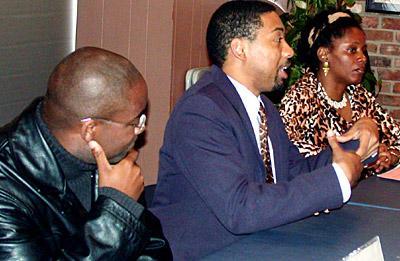The Black Student Union held a forum Wednesday night on the importance of fighting for slavery reparations for blacks across the country.
Students from the University listened at the African American Cultural Center as three panelists discussed issues within the African American society.
Antoinette Harrell-Miller, a New Orleans television talk show host and genealogy teacher, said she believes there is a very compelling moral case for reparations because it is the right and moral thing to do.
“It’s not an unreasonable demand,” Harrell-Miller said. “It’s not just about segregation and slavery, it’s about what could have happened if black folk got their 40 acres and a mule they were promised.”
Harrell-Miller has made fighting for reparations her full time job, looking up information on her family tree and learning about her ancestors’ past.
“I found papers saying my great-great-grandmother and her son were sold for $1,100,” she said. “I won’t let America forget.”
Harrell-Miller said the groundwork is being laid for getting reparations, and she currently is preparing to go to Chicago to face a court on this subject.
“I’m glad to see that Japanese Americans are supporting us because they got together and got their reparations,” she said. “And the Jews will never let you forget about the Holocaust.”
In the question-and-answer session, one student asked why the black community has not come together as a group to push for action. Harrell-Miller said the general consensus of the group is passive.
“It’s easier for me to pass the responsibility on to someone else and give it for them to do,” Harrell-Miller said. “And some people are working two or three jobs, and they’re too tired to fight and talk about reparations.”
Albert Samuels, a Southern University professor, said there is an assumption that because blacks have a common experience, that should be the organizing principle.
“We are not a monolithic people, so one of the things that holds us back is that we’re all black, so we all think alike,” Samuels said. “People say, ‘You aren’t black because you think that,’ or ‘You’re not black because you believe that.’ Being black doesn’t mean I have to agree with you.”
He said most movements started with small group of people and having a passionate group can be enough to get attention.
“Jesus only picked 12 people,” Samuels said. “We think we have to get together to get anything done, and we don’t ever get together, so nothing ever gets done.”
Leonard Moore, a history professor, said blacks in and around Baton Rouge have no reason to sit back and not take action because the city has the second highest percentage of black college students in any metropolis with a population under two million.
“We don’t have any political movements,” Moore said. “We sit around and talk about who laid who and the latest clothes, but we need to get involved. Take some black courses and learn about yourself.”
Harrell-Miller said many blacks do not know their genealogy, and the importance of learning their ancestors goes beyond knowing their family history.
“It’s not a hobby, it’s a necessity,” Harrell-Miller said. “What did we get? Absolutely nothing. What are we owed? Everything.”
Forum addresses slavery reparations
April 10, 2003

Forum addresses slavery reparations



